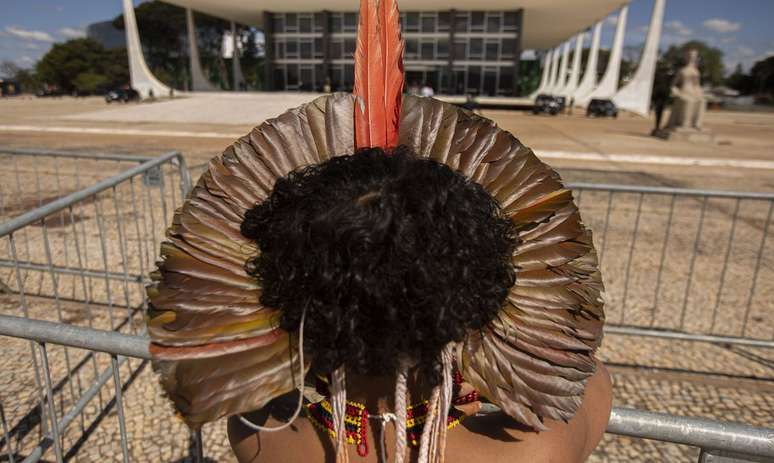The session was adjourned in June after a request for an opinion
The Federal Supreme Court (STF) resumed today (30) the sentence of the trial that deals with the constitutionality of the term for the delimitation of indigenous lands.
In June this year, the trial was suspended following a request for reconsideration made by Minister André Mendonça, who had up to 90 days to refer the case back to trial, in accordance with the internal rules of the Supreme Court.
The score of the test is 2 votes against 1 with respect to the time period. Edson Fachin and Alexandre de Moraes were against the agreement, while Nunes Marques was in favor.
The votes of ministers André Mendonça, Cristiano Zanin, Luís Roberto Barroso, Dias Toffoli, Luiz Fux, Cármen Lúcia, Gilmar Mendes and the president of the Court, Rosa Weber are missing.
At the trial, the ministers discuss the so-called timing. According to the thesis, defended by landowners, indigenous peoples would only have rights to lands that were in their possession on October 5, 1988, the date the Federal Constitution came into effect, or that were in legal conflict at the time. Indigenous peoples are against understanding.
The process that motivated the discussion concerns the dispute over the ownership of the Indigenous Land (TI) Ibirama, in Santa Catarina. The area is inhabited by the Xokleng, Kaingang and Guarani peoples, and the ownership of part of the land is questioned by the State Prosecutor’s Office.

6 important points to understand the issue of timing
Reviews
Minister Alexandre de Moraes gave the last vote on the timing before the interruption of the trial, on 7 June. He voted against the thesis of the timetable. For Moraes, the recognition of indigenous land ownership does not depend on the existence of a time frame based on the entry into force of the 1988 Constitution.
However, the minister voted to guarantee landowners who hold title to indigenous lands the right to full compensation for expropriation.
Moraes also defined that, if the federal government fails to recover the indigenous lands, it will be possible to make a compensation with other equivalent lands, “subject to the express agreement” of the indigenous community.
The minister’s vote is criticized by organizations working in defense of indigenous peoples. According to the Articulação dos Povos Indígenas do Brasil (Apib), the thesis is “disastrous” and could make demarcations unfeasible.
“It is concluded that the proposal by Minister Alexandre de Moraes undermines the protection of indigenous constitutional rights. Furthermore, it places on indigenous peoples the burden of shouldering the historical errors committed by the Brazilian state itself, to the extent that the guarantee of rights under their traditionally occupied territories will depend on the existence of financial resources from the Brazilian state,” the agency said.
Even the Indigenous Missionary Council (CIMI) disagrees with Moraes’ understanding. For Cimi, the possibility of compensation or territorial compensation will increase the conflicts in the countryside.
“How could the Union pay, in the form of compensation, land that it already owns? We answer: it would be unimaginable, because this figure does not exist and there is no room for our constitutional legal universe to admit it”, declared the advise.
Mobilization
Apib has called for a national mobilization to defend the reversal of the thesis. Today and tomorrow the organization intends to accompany the trial in Brasilia.
Last week, the legal coordinator of the entity, Maurício Terena, was in Geneva, Switzerland, and met with representatives of the United Nations (UN) to avoid setbacks.
“We are calling for a demonstration at the United Nations so that any attempt at reconciliation that limits indigenous peoples’ right to land is considered a violation of international human rights treaties to which Brazil is a signatory,” he said.
Edition: Adjutant Grace
Source: Terra
Rose James is a Gossipify movie and series reviewer known for her in-depth analysis and unique perspective on the latest releases. With a background in film studies, she provides engaging and informative reviews, and keeps readers up to date with industry trends and emerging talents.







